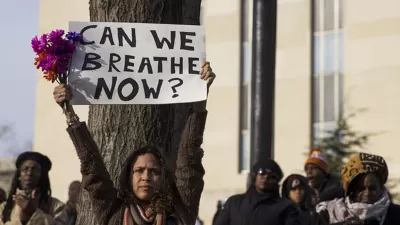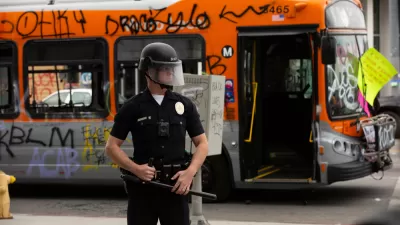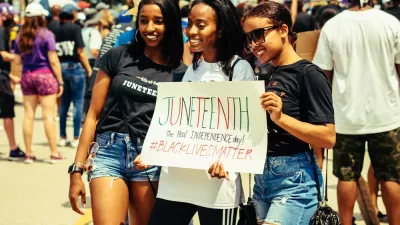An urban planner in Vancouver defines the roots of racism in city building, and calls on urban planners to be more effective anti-racist allies.

Amina Yasin, an urban planner and planning commissioner in Vancouver, writes for The Tyee with four recommendations for reckoning with the history of racism in urban planning.
As an urban planner, I’ve been contemplating this problem and the ways the planning profession has had its knees in the necks of Black people through policy, top-down design approaches and unacknowledged white privilege. These factors, along with public space enforcement and anti-Blackness have been suffocating Black communities for decades.
Taking the kind of action that effectively accounts for planning's role in setting the stage for the racist realities of the day might require a re-evaluation of causes that seemed in solidarity with anti-racist action, according to Yasin.
Given the number of Black people profiled and murdered on our streets, how can urbanists remain singularly focused on fighting inanimate objects — like cars — while actively ignoring human rights, and silencing advocates who point out that streets aren’t in reality for everyone? Perhaps systemic racism, in which ableism is entrenched, is the greatest enemy to cities and not cars?
In making the point that some ostensibly progressive causes fall short of effective anti-racist action, Yasin is reiterating a point made by other Black advocates in response to the recent high-profile tragedies of police violence, and it's a point that bears repeating. With that foundation laid, Yasin lists four actions for planners to take to deliver on anti-racist intentions, with more detail included in the source article:
- Recognize your role.
- Divest from the theory of Crime Prevention Through Environmental Design.
- Defund policing.
- Abolish ‘communicide’ urban planning.
That last recommendation deserves some extra attention as a source of potential complication in the messaging that has emerged in recent weeks. While some urbanists and planning experts have pointed to the history of exclusionary zoning as a racist cause, with effects including segregation and poor economic and public health outcomes, other advocates have been pushing back on upzonings and other forms of new, planned density as detrimental to local communities, especially low-income and communities of color.
"An immediate anti-racist action that we can take is to stop systematically 'revitalizing' predominantly Black and Indigenous communities, while seeing other neighbourhoods as being the pinnacle of peak livability or perfection," writes Yasin.
FULL STORY: Whose Streets? Black Streets

Maui's Vacation Rental Debate Turns Ugly
Verbal attacks, misinformation campaigns and fistfights plague a high-stakes debate to convert thousands of vacation rentals into long-term housing.

Planetizen Federal Action Tracker
A weekly monitor of how Trump’s orders and actions are impacting planners and planning in America.

In Urban Planning, AI Prompting Could be the New Design Thinking
Creativity has long been key to great urban design. What if we see AI as our new creative partner?

King County Supportive Housing Program Offers Hope for Unhoused Residents
The county is taking a ‘Housing First’ approach that prioritizes getting people into housing, then offering wraparound supportive services.

Researchers Use AI to Get Clearer Picture of US Housing
Analysts are using artificial intelligence to supercharge their research by allowing them to comb through data faster. Though these AI tools can be error prone, they save time and housing researchers are optimistic about the future.

Making Shared Micromobility More Inclusive
Cities and shared mobility system operators can do more to include people with disabilities in planning and operations, per a new report.
Urban Design for Planners 1: Software Tools
This six-course series explores essential urban design concepts using open source software and equips planners with the tools they need to participate fully in the urban design process.
Planning for Universal Design
Learn the tools for implementing Universal Design in planning regulations.
planning NEXT
Appalachian Highlands Housing Partners
Mpact (founded as Rail~Volution)
City of Camden Redevelopment Agency
City of Astoria
City of Portland
City of Laramie





























